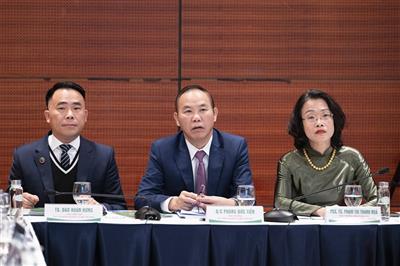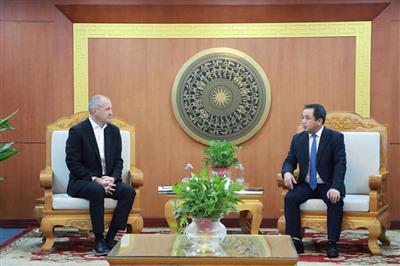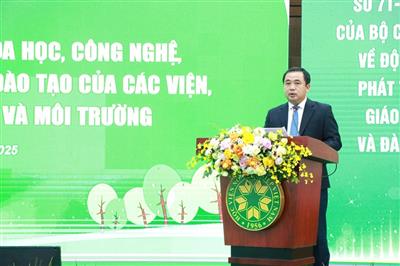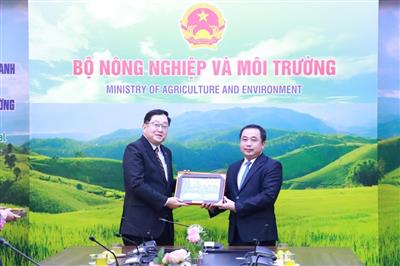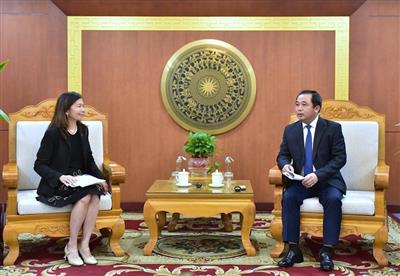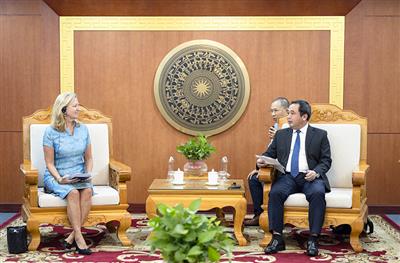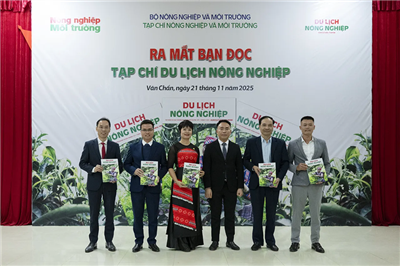
Vietnam-Singapore climate cooperation: New opportunities for the carbon market and sustainable development
16/09/2025TN&MTOn September 16, the governments of Vietnam and Singapore officially signed an agreement to implement Article 6 of the Paris Agreement on climate change. The signing ceremony was held online, attended by Vietnam’s Acting Minister of Agriculture and Environment Tran Duc Thang and Singapore’s Minister for Environment and Sustainability and Minister-in-charge of Trade Relations Grace Fu. The agreement establishes a bilateral legal framework, paving the way for emissions reduction projects in Vietnam to be recognized and participate in the international carbon credit market.
A milestone in bilateral climate cooperation
At the signing ceremony, Acting Minister Tran Duc Thang highlighted: “Today’s agreement marks an important step in climate cooperation between our two countries, affirming the roles and responsibilities of Vietnam and Singapore in promoting the exchange of greenhouse gas emissions reductions and carbon credits.”
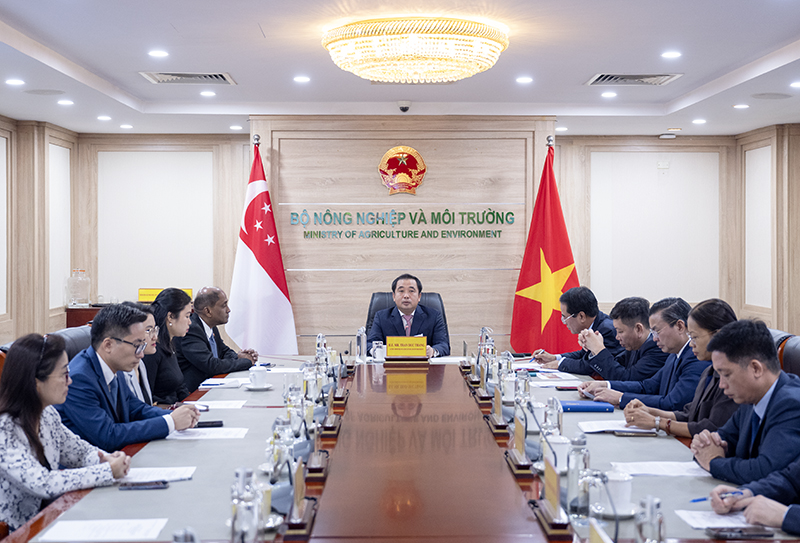
On September 16, Vietnam and Singapore signed a bilateral agreement under Article 6 of the Paris Agreement, enabling Vietnamese emissions reduction projects to participate in the international carbon credit market. The ceremony was held online with Acting Minister Tran Duc Thang and Minister Grace Fu in attendance (Photo: Minh Thanh)
He emphasized that the agreement provides a bilateral legal basis for Vietnamese businesses to register emissions reduction projects and generate carbon credits that meet international standards. This framework enables Vietnam to access new climate finance, promote investment in advanced technologies, develop sustainable agriculture, and move towards a circular economy.
Vietnam is currently completing the institutional framework to operate its domestic carbon market, from provisions in the 2020 Environmental Protection Law to implementing decrees. Singapore, meanwhile, has pioneered carbon pricing legislation since 2019 and operates recognized international exchanges such as CIX and ACX. This partnership is expected to allow the two countries to complement each other’s strengths and gradually shape a regional carbon market.
Under the agreement, recognized emissions reduction projects in Vietnam can transfer carbon credits to Singapore. This mechanism not only opens new economic opportunities for Vietnamese businesses but also attracts international capital to clean energy, green industry, and smart agriculture sectors.
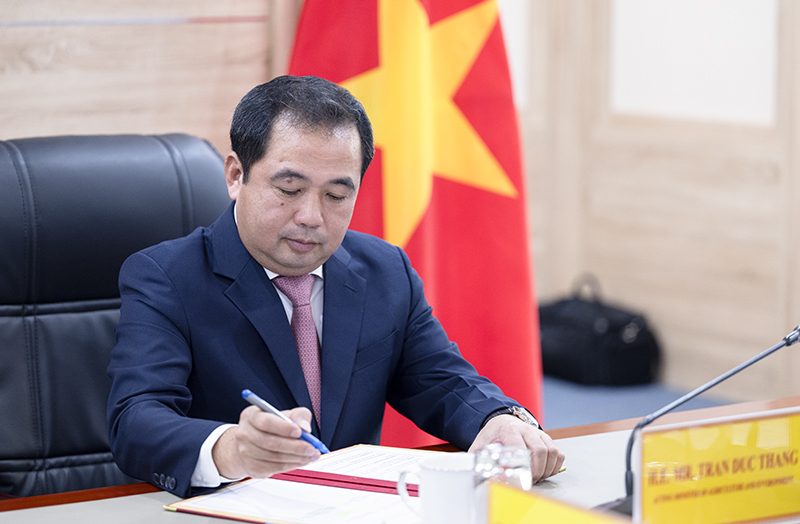
Acting Minister Tran Duc Thang said the Ministry will finalize the implementation plan and hopes Singaporean businesses will invest in Vietnam’s carbon projects, enhancing credit quality and community benefits (Photo: Minh Thanh)
Acting Minister Tran Duc Thang remarked that the Ministry of Agriculture and Environment will coordinate with relevant agencies to finalize the implementation plan. He also expressed the expectation that Singaporean enterprises will actively invest in projects in Vietnam, improving the quality of carbon credits and generating sustainable value for local communities.
Green investment opportunities and socio-economic benefits
The agreement is expected to bring tangible benefits to local communities. Emissions reduction projects can create jobs, improve access to clean water, strengthen energy security, and reduce environmental pollution. Additionally, green investment from Singapore is anticipated to stimulate the development of clean industries, renewable energy, sustainable agricultural technologies, and environmentally friendly infrastructure.
Vietnam is one of Singapore’s key economic partners. In 2024, Vietnam ranked 11th among Singapore’s largest trading partners, while Singapore remained the largest foreign investor in Vietnam. This close trade and investment relationship provides a strong foundation for implementing carbon credit projects and promotes the country’s transition towards a green economy and circular development.
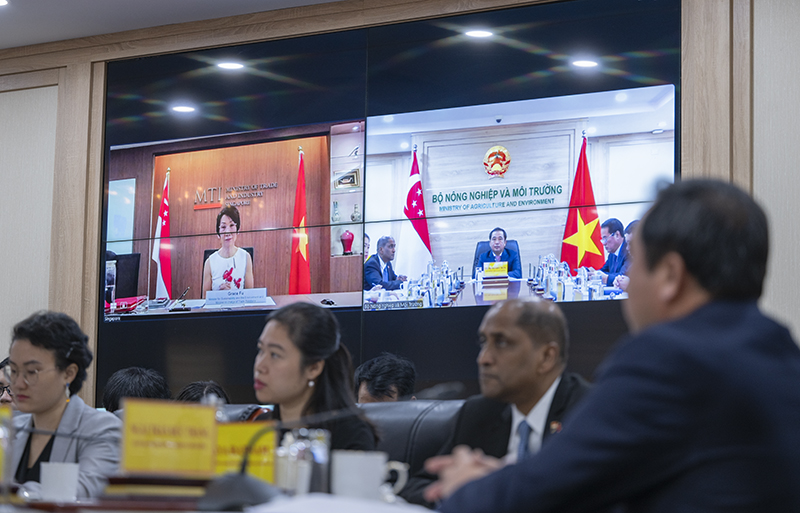
At the signing, Minister Grace Fu highlighted that the agreement strengthens climate action and green investment opportunities, reflecting the long-term partnership and shared commitment to sustainable development between Vietnam and Singapore (Photo: Minh Thanh)
At the signing, Minister Grace Fu emphasized: “Today’s agreement not only reflects our commitment to addressing climate change but also opens new opportunities for green investment in Vietnam, supporting finance for climate adaptation activities.”
She noted that 2025 holds special significance for both countries: Vietnam is celebrating 80 years since the establishment of the nation, 50 years of reunification, and 30 years of ASEAN membership; Singapore is marking 60 years of independence. In the context of the upgraded Comprehensive Strategic Partnership established in March 2025, the agreement demonstrates the substantive and long-term commitment of both countries in emerging areas, particularly green transition and sustainable development.
Minister Grace Fu also acknowledged the persistent work of the technical teams from both sides over the years to finalize the agreement. She expressed confidence that its implementation will make Vietnam and Singapore pioneers within ASEAN in the mechanism for exchanging international carbon credits.
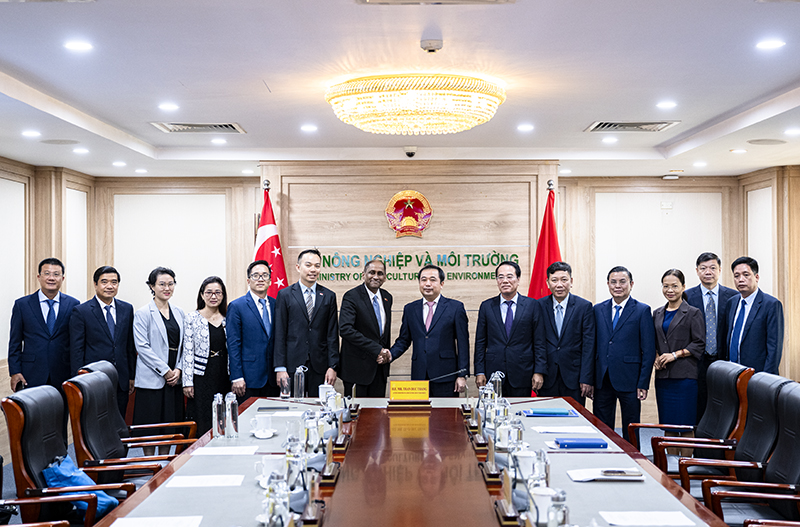
Vietnam–Singapore carbon credit cooperation brings bilateral benefits and supports Paris Agreement goals, with projects creating jobs, improving water access, and promoting sustainable development in the region (Photo: Minh Thanh)
The carbon credit cooperation between Vietnam and Singapore provides bilateral benefits while contributing to the global effort to implement the Paris Agreement. The agreement enables emissions reduction projects with direct community benefits, such as job creation, improved access to clean water, enhanced energy security, and reduced environmental pollution.
In the context of accelerating climate change, the joint step taken by Vietnam and Singapore demonstrates strong political commitment and creates momentum for ASEAN to advance low-carbon economic transitions and sustainable development.
Article 6 of the Paris Agreement allows countries and enterprises to exchange carbon credits based on internationally recognized emissions reduction projects. By establishing a bilateral legal framework, Vietnamese businesses can register emissions reduction projects, generate internationally certified carbon credits, and transfer them to Singapore. This legal foundation ensures that emissions reduction projects are recognized, transparent, and commercially viable.
Minh Thanh - Ngoc Huyen




